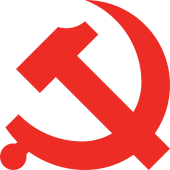Politburo Standing Committee
|
Standing Committee of the Central Political Bureau of the Communist Party of China 中国共产党中央政治局常务委员会 |
|
|---|---|
 |
|
| Leadership | |
|
Status
|
Highest body of the Central Committee between sessions, Communist Party of China
|
|
Members
|
|
|
Elected by
|
|
|
Responsible to
|
|
| Seats | 5-9 historically; 7 currently |
| Standing Committee of the Politburo of the Communist Party of China | |||||||
| Simplified Chinese | 中国共产党中央政治局常务委员会 | ||||||
|---|---|---|---|---|---|---|---|
| Traditional Chinese | 中國共產黨中央政治局常務委員會 | ||||||
| Literal meaning | China Communist Party Central Politburo Standing Committee | ||||||
|
|||||||
| Abbreviation(s) | |||||||
| Simplified Chinese | ((中共)中央)政治局常委会 | ||||||
| Traditional Chinese | ((中共)中央)政治局常委會 | ||||||
| Literal meaning | ((CPC) Central) Politburo Standing-Committee | ||||||
|
|||||||
| Transcriptions | |
|---|---|
| Standard Mandarin | |
| Hanyu Pinyin | Zhōngguó Gòngchǎndǎng Zhōngyāng Zhèngzhìjú Chángwù Wěiyuánhuì |
| Transcriptions | |
|---|---|
| Standard Mandarin | |
| Hanyu Pinyin | ((Zhōnggòng) Zhōngyāng) Zhèngzhìjú Chángwěihuì |
The Standing Committee of the Central Political Bureau of the Communist Party of China, usually known as the Politburo Standing Committee (PSC), is a committee consisting of the top leadership of the Communist Party of China. Historically it has been composed of five to nine members, and currently has seven members. Its officially mandated purpose is to conduct policy discussions and make decisions on major issues when the Politburo, a larger decision-making body, is not in session. According to the party's Constitution, the General Secretary of the Central Committee must also be a member of the Politburo Standing Committee.
While the PSC in theory reports into the Politburo, which in turn reports into the larger Central Committee, in practice the PSC acts as the most powerful decision-making body in China, and its decisions de facto have the force of law. Its membership is closely watched by both the national media as well as political watchers abroad. Historically, the role of the PSC has varied and evolved. During the Cultural Revolution, for example, the PSC had little power.
The membership of the PSC is strictly ranked in protocol sequence. Historically, the General Secretary (or Party Chairman) has been ranked first; the rankings of other leaders have varied over time. Since the 1990s, the General Secretary, Premier, Chairman of the National People's Congress, the Chairman of the Chinese People's Political Consultative Conference, the Secretary of the Central Commission for Discipline Inspection, the party's top anti-graft body, and the first-ranked Secretary of the Secretariat have consistently also been members of the Politburo Standing Committee. The portfolios of additional members varied.
The Politburo Standing Committee is technically responsible to the Politburo of the Communist Party of China. In Chinese political usage, a "Standing Committee" (常务委员会, Chángwù Wěiyuánhuì) simply refers to a body that carries out the day-to-day affairs of its parent organ, in this case, the Politburo. The Politburo, in turn, is a policy making body that is formally responsible to the larger Central Committee, which meets at plenary sessions usually once every year.
...
Wikipedia
